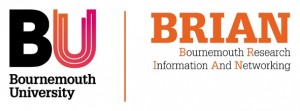 IT are undertaking essential maintenance to the BRIAN servers on Thursday 11th October 8am. This will involve BRIAN being unavailable to users for a short period of time.
IT are undertaking essential maintenance to the BRIAN servers on Thursday 11th October 8am. This will involve BRIAN being unavailable to users for a short period of time.
We will communicate on the blog as soon as BRIAN is up and running again.
Latest research and knowledge exchange news at Bournemouth University
 IT are undertaking essential maintenance to the BRIAN servers on Thursday 11th October 8am. This will involve BRIAN being unavailable to users for a short period of time.
IT are undertaking essential maintenance to the BRIAN servers on Thursday 11th October 8am. This will involve BRIAN being unavailable to users for a short period of time.
We will communicate on the blog as soon as BRIAN is up and running again.
Dr Sascha Dov Bachmann, Associate Professor in International Law (BU) and War Studies (Swedish Defence University), acting Director of BU’s Centre for Conflict,Rule of Law and Society has joined forces with Professor Louis de Koker and Professor Pompeu Casanovas from La Trobe University, Melbourne, Australia to convene the conference
Global peace and security has seen the arrival of new security threats in the form of hybrid threats and cyber-attacks.
This symposium provides a platform for the discussion of a new form of warfare, namely ‘hybrid warfare’. Hybrid war is the use of a range of non-conventional methods (e.g. cyber warfare and lawfare) in order to disrupt, discourage and disable an adversary’s capabilities without engaging in open hostilities and may use the full range of military and non-military options for achieving its strategic objectives. Such hybrid warfare might include aspects of ‘cyber terrorism’, ‘cyber war’ and cyber-based ‘information operations’, a topic of particular interest given Russia’s ‘Ukrainian Spring’, the continuing threat posed by radical Islamist groups in Africa, the Middle East and the Asia-Pacific region as well geopolitical shifts.
The interdisciplinary symposium will discuss military doctrines, new and traditional approaches to war and peace and its perceptions, the use of cyber warfare, the use of mass media communication to meddle in internal state affairs, including impact on state elections and public sentiment, as well as the use of lawfare (the strategy of using – or misusing – law as a substitute for traditional military means to achieve a war-fighting objective) to achieve military goals in a non-kinetic way and the use of various means to disrupt a nation’s economy, public services and national interests.
At the heart of the symposium stand the questions of how to increase resilience and whether responses to such hybrid threats need to change in the future.
This seminal conference brings together academics and military professionals from the region and beyond to discuss new security challenges from a Asia-Pacific and especially an Australian perspective.
Deadline for submissions: 31 October 2018
Symposium Date: 25 – 26 March 2019
Place: La Trobe University, Melbourne, Australia
Proposals must be sent by email to the Lead Convenor: Professor (AP) Sascha Dov Bachmann (email: sbachmann@bournemouth.ac.uk).
Convenors:
Research participants needed!
The Centre for Biomechanics Research (located at the AECC University College, Parkwood Campus) is currently conducting a study investigating low back joint motion patterns in pain free adults. This study has National Research Ethical approval and aims to establish normal spine motion, which will support future investigations into low back pain and its possible treatments.
To collect the required data, pain free volunteers between 30 and 70 years of age are needed who are willing to have their low backs scanned with a method called ‘Quantitative Fluoroscopy’. This will take place in the AECC University College Chiropractic Clinic and takes no more than 1 hour.
Taking part in this study means that you are helping to advance science which will benefit many patients in the future. Additionally, this is an excellent opportunity for healthcare students and staff to learn more about this emerging technology.
Please contact us at cbrstudies@aecc.ac.uk if you are interested in taking part and we will send you more information about this study. We are looking for approximately 100 more volunteers, so we’d like to encourage you to spread this information to family and friends who can also be welcomed as participants.
Kind regards
Alan Breen (Professor of Musculoskeletal Research)
Alex Breen (Post-Doc and Technology Lead)
Emilie Claerbout (Bournemouth University Student)
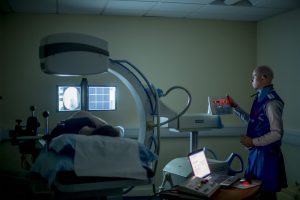
 Professor Genoveva Esteban (Department of Life and Environmental Sciences, Faculty of Science and Technology) in collaboration with the Freshwater Biological Association, is running an Advanced Training Course on Freshwater Taxonomy and Field Identification Skills for PhD students, early-career researchers, and post-grads.
Professor Genoveva Esteban (Department of Life and Environmental Sciences, Faculty of Science and Technology) in collaboration with the Freshwater Biological Association, is running an Advanced Training Course on Freshwater Taxonomy and Field Identification Skills for PhD students, early-career researchers, and post-grads.
The course has been funded by the Natural Environment Research Council (NERC) and has a maximum of 20 places available for UK-based applicants. Travel (up to £100) and accommodation are covered. The course will be based at the River Laboratory in Dorset, 24th-28th September 2018.
To find out more and to apply visit: https://www.fba.org.uk/courses
Deadline is now 31st July 2018.
If you require further information please contact Genoveva Esteban gesteban@bournemouth.ac.uk

Today colleagues will be available on both campuses to answer all your queries in regards to Open Research.
We’ll be in BG11 on Lansdowne between 9 and 12pm and FG04 on Talbot between 1 and 4pm.
Pop on down… there is cake! 🙂


 You’ll all be really glad to know that BRIAN is now up and running!
You’ll all be really glad to know that BRIAN is now up and running!
 BRIAN will be unavailable to users on Monday 30th April and Tuesday 1st May for a scheduled upgrade.
BRIAN will be unavailable to users on Monday 30th April and Tuesday 1st May for a scheduled upgrade.
All relevant guidance notes and video guides on the Staff Intranet will be updated in due course. If you need any help using the new system or if you encounter any problems after the upgrade, please do send an email to BRIAN@bournemouth.ac.uk and a member of staff will be able to assist you.
BRIAN training sessions are also available every two months and are bookable through Organisational Development . The next session scheduled is:
In the meantime, if you do have queries relating to the upgrade, please get in touch with BRIAN@bournemouth.ac.uk
 BRIAN will be upgrading to a new version next week, so will be inaccessible to users on Monday 30th April and Tuesday 1st May.
BRIAN will be upgrading to a new version next week, so will be inaccessible to users on Monday 30th April and Tuesday 1st May. All relevant guidance notes and video guides on the Staff Intranet will be updated in due course. If you need any help using the new system or if you encounter any problems after the upgrade, please do send an email to BRIAN@bournemouth.ac.uk and a member of staff will be able to assist you.
BRIAN training sessions are also available every two months and are bookable through Organisational Development . The next session scheduled is:
In the meantime, if you do have queries relating to the upgrade, please get in touch with BRIAN@bournemouth.ac.uk
FINAL CFP: Nexus of Migration and Tourism: Creating Social Sustainability Symposium
20-21 September, Vietnam National University, Hanoi
Deadline for Abstracts: 15 March 2018
For more information: https://tourism-migration.co.uk/
We are delighted to announce that, with quality submissions, we will potentially organise two special issues with two sponsoring journals: ‘Tourism Geographies’ http://www.tgjournal.com/ & ‘e-Review of Tourism Research’ https://ertr.tamu.edu/
Keynote Speakers:
Prof Michael Hitchcock, Goldsmiths, University of London
Prof Adele Ladkin, Bournemouth University, UK
Prof Alan Lew, Northern Arizona University, USA
Prof Sabine Marschall, University of KwaZulu-Natal, South Africa
Prof Noel Salazar, KU Leuven, Belgium
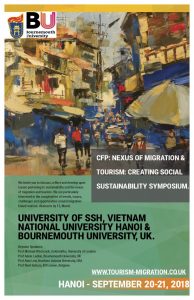
Despite rapid tourism economic development, and research into labour and employment such as economics and employment issues, research hasn’t caught up to the rapidly changing issues, such as tourism linked migration and social and cultural aspects of sustainability. Thus, we invite you to discuss, reflect and develop upon issues pertaining to sustainability and the nexus of migration and tourism. We are particularly interested in the complexities of trends, issues, challenges and opportunities around migration linked tourism, which remains a relatively minor part in academic research. While large numbers of migrant workers move to ‘new’ tourist destinations such as Singapore, Hong Kong, Macau and Dubai for employment, issues pertaining to social sustainability (e.g., well-being, quality of life, integration, the distribution of power and resources, employment, education, the provision of basic infrastructure and services, freedom, justice, access to influential decision-making) have yet to be fully developed within tourism research.
We invite contributions from a variety of disciplines including anthropology, cultural/human geography, sociology, psychology, cultural studies, economics, border studies, leisure studies, tourism studies and hospitality/event management. We invite you to submit papers on topics that include (but are not limited to):
– (Re)definitions of social sustainability
– Equitable access and the sustainability of the community
– Creating socially sustainable communities
– Migrant quality of life/ community well-being in tourist destinations
– Migrant tourism workers’ integration & inclusion
– Migration and tourist community formation
– Conflicts between/intersection of tourists, local residents and migrant workers
– Tourism (im)mobilities, ethics, morals and (in)justice
– Tourism mobilities and border crossings
– Human security, transnationalization and citizenship
– Social networks, borders and the allure of tourist destinations
– Gender and mobility in tourism
– Intersectionality, gender and race
– Roles of religion in tourism migration and mobilities
– Religious and spiritual mobilities and tourism
– Migrant leisure spaces, constraints and opportunities
– Academic mobilities / Mobilities in education
– Social sustainability in ASEAN tourism development
– Social sustainability and future directions
– Destinations resilience
– Effect of Brexit and Trump on tourism and migration
Submission Deadlines: 500 words abstract due 15 March 2018
Confirmation of acceptance: 1 April 2018
Please see this web link for more information: https://tourism-migration.co.uk/
If you have any questions or like to be on a mailing list, please email Jaeyeon Choe (jchoe@bournemouth.ac.uk).
Thank you!

Professor Jens Holscher gave another interview to the Express on Brexit and the European Court of Justice:
https://www.express.co.uk/news/politics/929549/brexit-news-theresa-may-eu-regulation-uk-european-court-of-justice-trade-deal-tusk
We are very pleased to annouce CFP: Nexus of Migration and Tourism: Creating Social Sustainability Symposium on 20-21 September at Vietnam National University, Hanoi.
Deadline for Abstracts: 15 March 2018
For more information: https://tourism-migration.co.uk.
Keynote Speakers:
Prof Michael Hitchcock, Goldsmiths, University of London
Prof Adele Ladkin, Bournemouth University, UK
Prof Alan Lew, Northern Arizona University, USA
Prof Noel Salazar, KU Leuven, Belgium
Book Launch:
‘Tourism and Memories of Home: Migrants, Displaced People, Exiles and Diasporic Communities’ by Dr. Sabine Marschall, University of KwaZulu-Natal, South Africa
We are also delighted to announce that, with quality submissions, we will potentially organise two special issues with two sponsoring journals: ‘Tourism Geographies’ http://www.tgjournal.com/ & ‘e-Review of Tourism Research’ https://ertr.tamu.edu/
Looking forward to receiving your abstract by 15 March!
#tourismmigration18
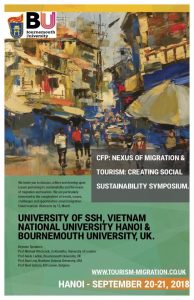
Bournemouth University leads the Kosovo-strand of a major four-year AHRC ‘Global Challenges’ project titled ‘Changing the Story‘. This project aims at supporting the building of inclusive civil societies (CSOs) with, and for, young people in five post-conflict countries. It asks how the arts, heritage, and human rights education can support youth-centred approaches to civil society building in Cambodia, Colombia, Kosovo, Rwanda and South Africa. The Kosovo strand benefits from an established track record of collaboration with University of Prishtina (Co-I) and Stacion: Centre for Contemporary Arts in Prishtina as well as several arts-based civil society organisations in the country. The BU-led strand focuses on formal and informal civic education through the arts in Kosovo, to be explored locally by a Postgraduate Research Assistant, attached to University of Prishtina, through a critical review and proof of concept exercise during the first year. In support, BU is contributing a fully-funded PhD scholarship under the title ‘Imagining New Futures: Engaging Young People Through Participatory Arts in Post-Conflict Kosovo‘, which is currently being advertised.
International collaborative activities commenced last week in collaboration with an internationally-acclaimed CSO partner in Dorset, devoted to developing global youth citizenship through culture and the arts. The award-winning Complete Freedom of Truth project (TCFT), with which BU collaborated already previously, kindly offered a one-week residency to Albert Heta, Director of Stacion: Centre for Contemporary Arts in Prishtina. This residency brought together a group of artists, workshop leaders and young people from across the UK between February 12 and 16 in Bridport. Albert’s visit from Kosovo was funded by the AHRC and facilitated by BU’s new Research Centre ‘Seldom Heard-Voices: Marginalisation and Society Integration’ of the Faculty of Health and Social Sciences (FHSS). Together with Albert, some of the Centre’s members also participates in the events organised by TCFT, exchanged experiences and discussed best practice of working with young people of various background through the arts towards social justice. TCFT has a long history of working with young people, internationally, starting in post-conflict Srebrenica in 2008. Based on our observations during one week in Dorset, including of the issues selected as important by the young UK-participants during this period, we are currently reflecting on the extent to, and ways in, which arts-based interventions with a given set of young people in one specific socio-cultural context and its underpinning conceptualisations (such as of empowerment or vulnerability of, and pressures on, young people) can or cannot be transferred to another, such as that in which young people in Kosovo negotiate their aspirations.
Stephanie Schwandner-Sievers
sssievers@bournemouth.ac.uk
Photo credit below: Robert Golden
Kosovo strand activities begin via a global youth citizenship project
 Open access is about making the products of research freely accessible to all. It allows research to be disseminated quickly and widely, the research process to operate more efficiently, and increased use and understanding of research by business, government, charities and the wider public.
Open access is about making the products of research freely accessible to all. It allows research to be disseminated quickly and widely, the research process to operate more efficiently, and increased use and understanding of research by business, government, charities and the wider public.
There are two complementary mechanisms for achieving open access to research.
The first mechanism is for authors to publish in open-access journals that do not receive income through reader subscriptions.
The second is for authors to deposit their refereed journal article in an open electronic archive.
These two mechanisms are often called the ‘gold’ and ‘green’ routes to open access:
Article first published – http://www.hefce.ac.uk/rsrch/oa/whatis/
To encourage all academic communities to consider open access publishing, Authors Alliance has produced a comprehensive ‘Understanding Open Access‘ guide which addresses common open access related questions and concerns and provides real-life strategies and tools that authors can use to work with publishers, institutions, and funders to make their works more widely accessible to all.
To access and download the guide, please follow this link – http://authorsalliance.org/wp-content/uploads/Documents/Guides/Authors%20Alliance%20-%20Understanding%20Open%20Access.pdf
For any other open access related queries, please do get in touch with Shelly Anne Stringer in RKEO.
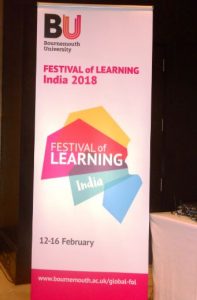 Just before the start of Bournemouth University’s Global Festival of Learning India (12-16 February) the Journal of Manmohan Memorial Institute of Health Sciences published Michelle Vickery’s paper ‘Female infanticide in India and its relevance to Nepal’ [1]. This article developed out of Michelle’s undergraduate Sociology thesis which she completed as part of her undergraduate degree in 2016.
Just before the start of Bournemouth University’s Global Festival of Learning India (12-16 February) the Journal of Manmohan Memorial Institute of Health Sciences published Michelle Vickery’s paper ‘Female infanticide in India and its relevance to Nepal’ [1]. This article developed out of Michelle’s undergraduate Sociology thesis which she completed as part of her undergraduate degree in 2016.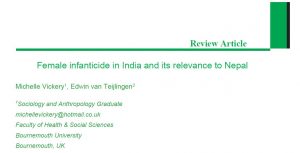 The Journal of Manmohan Memorial Institute of Health Sciences is an Open Access journal which means its content is freely available to any reader with internet access across the globe.
The Journal of Manmohan Memorial Institute of Health Sciences is an Open Access journal which means its content is freely available to any reader with internet access across the globe.
Over the last few years Bournemouth University academic have published papers on a range of topics related to India, for example on Media Studies [2-3], English literature [4] , Sociology [5], Public Health [6] , and environmental science and conservation [7-9].
Prof. Edwin van Teijlingen
CMMPH
References:
 Lizzie Gadd warns against jumping on ‘bad metrics’ bandwagons without really engaging with the more complex responsible metrics agenda beneath.
Lizzie Gadd warns against jumping on ‘bad metrics’ bandwagons without really engaging with the more complex responsible metrics agenda beneath.An undoubted legacy of the Metric Tide report has been an increased focus on the responsible use of metrics and along with this a notion of ‘bad metrics’. Indeed, the report itself even recommended awarding an annual ‘Bad Metrics Prize’. This has never been awarded as far as I’m aware, but nominations are still open on their web pages. There has been a lot of focus on responsible metrics recently. The Forum for Responsible Metrics have done a survey of UK institutions and is reporting the findings on 8 February in London. DORA has upped its game and appointed a champion to promote their work and they seem to be regularly retweeting messages that remind us all of their take on what it means to do metrics responsibly. There are also frequent twitter conversations about the impact of metrics in the up-coming REF. In all of this I see an increasing amount of ‘bad metrics’ bandwagon-hopping. The anti-Journal Impact Factor (JIF) wagon is now full and its big sister, the “metrics are ruining science” wagon, is taking on supporters at a heady pace.
It looks to me like we have moved from a state of ignorance about metrics, to a little knowledge. Which, I hear, is a dangerous thing.
It’s not a bad thing, this increased awareness of responsible metrics; all these conversations. I’m responsible metrics’ biggest supporter and a regular slide in my slide-deck shouts ‘metrics can kill people!’. So why am I writing a blog post that claims that there is no such thing as a bad metric? Surely these things can kill people? Well, yes, but guns can also kill people, they just can’t do so unless they’re in the hands of a human. Similarly, metrics aren’t bad in and of themselves, it’s what we do with them that can make them dangerous.
In Yves Gingras’ book, “Bibliometrics and Research Evaluation” he defines the characteristics of a good indicator as follows:
So, you might have an indicator such as ‘shoe size’, where folks with feet of a certain length get assigned a certain shoe size indicator. No problem there – it’s adequate (length of foot consistently maps on to shoe size); it’s sensitive to the thing it measures (foot grows, shoe size increases accordingly), and it’s homogenous (one characteristic – length, leads to one indicator – shoe size). However, in research evaluation we struggle on all of these counts. Because the thing we really want to measure, this elusive, multi-faceted “research quality” thing, doesn’t have any adequate, sensitive and homogeneous indicators. We need to measure the immeasurable. So we end up making false assumptions about the meanings of our indicators, and then make bad decisions based on those false assumptions. In all of this, it is not the metric that’s at fault, it’s us.
In my view, the JIF is the biggest scapegoat of the Responsible Metrics agenda. The JIF is just the average number of cites per paper for a journal over two years. That’s it. A simple calculation. And as an indicator of the communication effectiveness of a journal for collection development purposes (the reason it was introduced) it served us well. It’s just been misused as an indicator of the quality of individual academics and individual papers. It wasn’t designed for that. This is misuse of a metric, not a bad metric. (Although recent work has suggested that it’s not that bad an indicator for the latter anyway, but that’s not my purpose here). If the JIF is a bad metric, so is Elsevier’s CiteScore which is based on EXACTLY the same principle but uses a three-year time window not two, a slightly different set of document types and journals, and makes itself freely available.
If we’re not careful, I fear that in a hugely ironic turn, DORA and the Leiden Manifesto might themselves become bad (misused) metrics: an unreliable indicator of a commitment to the responsible use of metrics that may or may not be there in practice.
I understand why DORA trumpets the misuse of JIFs; it is rife and there are less imperfect tools for the job. But there are also other metrics that DORA doesn’t get in a flap about – like the individual h-index – which are subject to the same amount of misuse, but are actually more damaging. The individual h-index disadvantages certain demographics more than others (women, early-career researchers, anyone with non-standard career lengths); at least the JIF mis-serves everyone equally. And whilst we’re at it peer review can be an equally inadequate research evaluation tool (which, ironically, metrics have proven). So if we’re to be really fair we should be campaigning for responsible peer review with as much vigour as our calls for responsible metrics.

It looks to me like we have moved from a state of ignorance about metrics, to a little knowledge. Which, I hear, is a dangerous thing. A little knowledge can lead to a bumper sticker culture ( “I HEART DORA” anyone? “Ban the JIF”?) which could move us away from, rather than towards, the responsible use of metrics. These concepts are easy to grasp hold of, but they mask a far more complex and challenging set of research evaluation problems that lie beneath. The responsible use of metrics is about more than the avoidance of certain indicators, or signing DORA, or even developing your own bespoke Responsible Metrics policy (as I’ve said before this is certainly easier said than done).
The responsible use of metrics requires responsible scientometricians. People who understand that there is really no such thing as a bad metric, but it is very possible to misuse them. People with a deeper level of understanding about what we are trying to measure, what the systemic effects of this might be, what indicators are available, what their limitations are, where they are appropriate, how they can best triangulate them with peer review. We have good guidance on this in the form of the Leiden Manifesto, the Metric Tide and DORA. However, these are the starting points of often painful responsible metric journeys, not easy-ride bandwagons to be jumped on. If we’re not careful, I fear that in a hugely ironic turn, DORA and the Leiden Manifesto might themselves become bad (misused) metrics: an unreliable indicator of a commitment to the responsible use of metrics that may or may not be there in practice.
Let’s get off the ‘metric-shaming’ bandwagons, deepen our understanding and press on with the hard work of responsible research evaluation.

Elizabeth Gadd is the Research Policy Manager (Publications) at Loughborough University. She has a background in Libraries and Scholarly Communication research. She is the co-founder of the Lis-Bibliometrics Forum and is the ARMA Metrics Special Interest Group Champion
 Original content posted on The Bibliomagician reposted here with permission. Content is licensed under a Creative Commons Attribution 4.0 International License.
Original content posted on The Bibliomagician reposted here with permission. Content is licensed under a Creative Commons Attribution 4.0 International License.
Emerald has today, 26th September 2017, removed the embargo period on all Green open access. Author accepted manuscripts (AAMs or postprints) of journal articles held in open access repositories such as BURO will now be available on publication. This applies not only from today, but also to any Emerald publications currently under embargo in repositories.

Emerald Group Publishing
This is a huge advance for open access as Emerald had previously extended their embargo periods in response to the RCUK/ Finch statements on embargo periods and green open access.
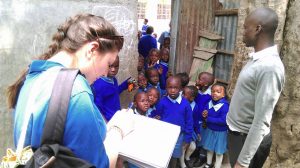
Over the Summer of 2017, project manager Katie Thompson has been working to redesign and improve the Wessex Portal to include a global conservation theme. The site has been enhanced to target a global audience, still focussing on key themes such as public engagement but also to include a global conservation section.
This new project was one of the outcomes of a recent visit to Kenya and South Africa by WP manager Katie Thompson, who developed collaboration with a school and charity organisation. These international trips focused on wildlife research and environmental education. Katie Thompson liaised with students and teachers, and is working to initiate an environmental club, with participation from the school. Children from the schools will be able to showcase their work online via the WP website and social media pages. This will be shown in the updated WP ‘Conservation Forum’ section of the website with public input (http://www.wessexportal.co.uk/conservation/).
An upcoming visit to South Africa next month will aim to build on these relationships, and expand upon organisations to collaborate with and expand outreach to international countries.
If you would like more information, then please do not hesitate to contact either Katie Thompson thompsonk@bournemouth.ac.uk or Genoveva Esteban gesteban@bournemouth.ac.uk (Principal Investigator) Join our website, and follow us on FB and twitter for regular updates.
 Last week (11-15 September 2017) saw the successful delivery of the NERC-funded Advanced Training Course Freshwater Taxonomy and Field Identification Skills, awarded to Professor Genoveva F. Esteban (SciTech, Department of Life and Environmental Sciences) in collaboration with the Freshwater Biological Association (https://www.fba.org.uk/fba). The course is free for PhD students and early-career researchers. With a strong emphasis on training excellence and practical hands-on experience this short course offers expert tuition in freshwater fieldwork, taxonomy, and freshwater science. The course provided in-depth training on the well-established use of macro-invertebrates as the core component of freshwater bio-assessment and also included specific training in field and laboratory methods for investigating and identifying microscopic organisms like diatoms, meiofauna and protists. The participants’ feedback was outstanding; Davina Hill from the University of Cumbria tweeted “Thanks for a fascinating and inspiring course in Freshwater Taxonomy. Recommended!”
Last week (11-15 September 2017) saw the successful delivery of the NERC-funded Advanced Training Course Freshwater Taxonomy and Field Identification Skills, awarded to Professor Genoveva F. Esteban (SciTech, Department of Life and Environmental Sciences) in collaboration with the Freshwater Biological Association (https://www.fba.org.uk/fba). The course is free for PhD students and early-career researchers. With a strong emphasis on training excellence and practical hands-on experience this short course offers expert tuition in freshwater fieldwork, taxonomy, and freshwater science. The course provided in-depth training on the well-established use of macro-invertebrates as the core component of freshwater bio-assessment and also included specific training in field and laboratory methods for investigating and identifying microscopic organisms like diatoms, meiofauna and protists. The participants’ feedback was outstanding; Davina Hill from the University of Cumbria tweeted “Thanks for a fascinating and inspiring course in Freshwater Taxonomy. Recommended!”
The course will also be delivered in 2018 (dates to be confirmed). Please contact Genoveva F. Esteban gesteban@bournemouth.ac.uk for further information. Photograph courtesy of Hai Luu.